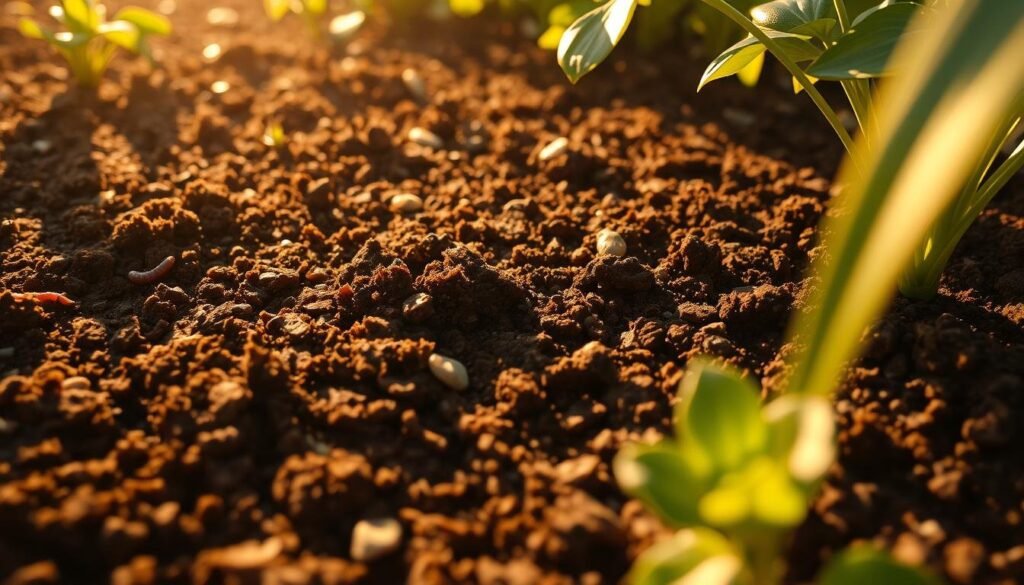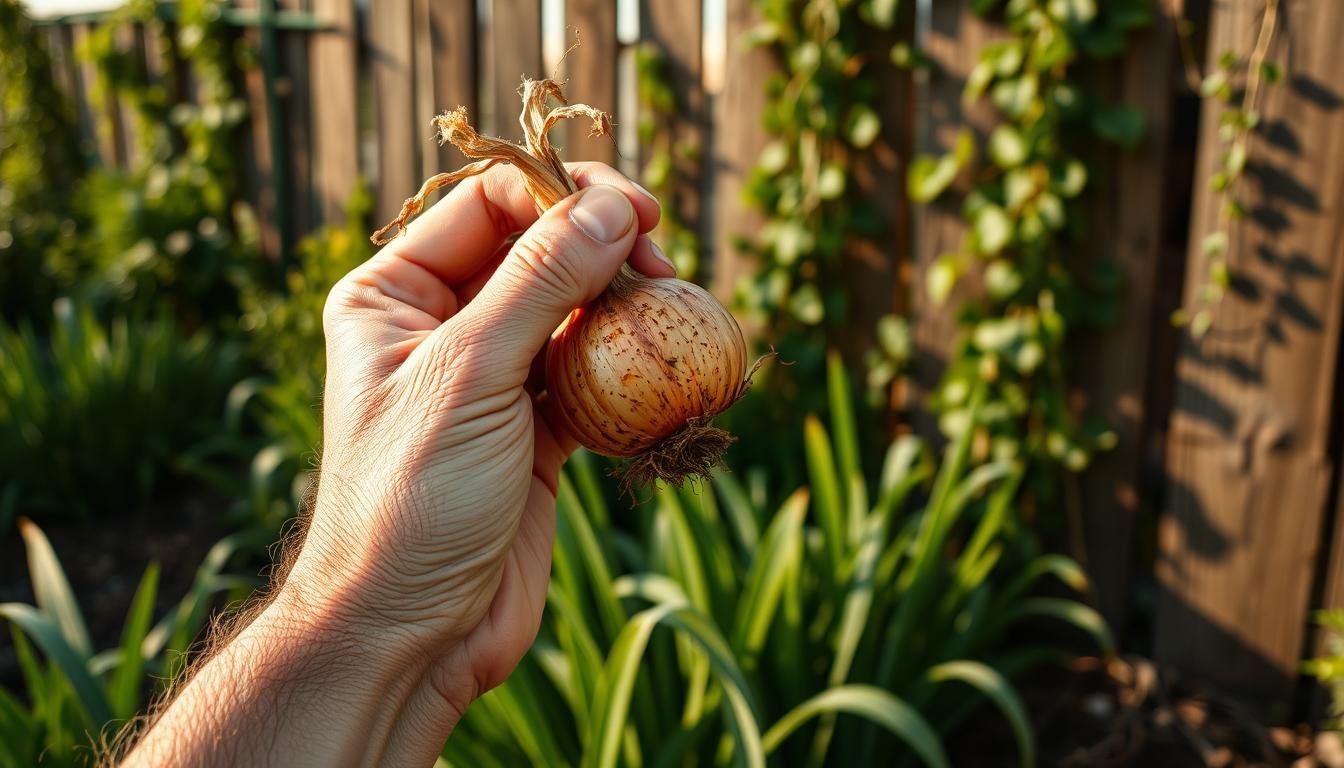Last updated on August 21st, 2025 at 02:44 pm
Eating Onions Straight from the Garden: When you pull a fresh onion from your garden, the urge to eat it right away is strong. But is it safe to eat onions directly from the garden?
Harvesting your own produce is rewarding for many gardeners. Yet, it’s key to think about the safety of eating raw produce, especially onions. While onions are common in many dishes, eating them straight from the garden might have risks.
Before you enjoy your freshly picked onions, it’s important to know the risks and benefits of eating them raw.
Contents
- 1 Understanding Garden Onions and Their Edibility
- 2 Can You Eat Onions Straight from the Garden?
- 3 Potential Risks and Concerns
- 4 Best Practices for Harvesting and Consuming Garden Onions
- 5 Conclusion: Eating Onions Straight from the Garden
- 6 FAQ
- 6.1 Are onions safe to eat straight from the garden?
- 6.2 How do I know if my garden onions are ready to eat?
- 6.3 Can I eat onions that have been treated with pesticides?
- 6.4 How should I clean my garden onions before eating them?
- 6.5 Are there any health benefits to eating onions straight from the garden?
- 6.6 Can I eat raw onions from my garden?
- 6.7 How do I store onions after harvesting?
- 6.8 Are there different types of onions, and can they all be eaten raw?
Understanding Garden Onions and Their Edibility
Garden onions come in many forms. Knowing which ones are safe to eat is important. You can grow different types of onions in your garden, each with its own special traits.
Bulb Onions vs. Green Onions
Bulb onions are the most common type. They are harvested when their tops start to turn yellow and fall over. Green onions, however, are picked before they form a bulb. You eat the whole plant, including the leaves.
Onions can be sweet or pungent, depending on their taste and sugar content. Sweet onions, like Texas Sweet or Vidalia, taste sweeter because they have less sulfur. Pungent onions have a stronger taste and are often used in cooking.
Young Green Onions
Young green onions are pulled before they mature. They taste milder than mature onions. They’re perfect for salads, garnishes, and as a raw snack.
Fully Mature Bulbs
Fully mature bulb onions are ready when their tops have died back. These onions can be stored for a long time. They’re great for cooking and caramelizing. Knowing the type of onion you’re growing or eating is important to enjoy its raw onion consumption benefits.
By understanding the different types of onions and their maturity stages, you can safely enjoy your garden’s harvest. You’ll appreciate the unique qualities of each variety.
Can You Eat Onions Straight from the Garden?
Harvesting onions from your garden is more than just picking a crop. It opens up a world of fresh tastes and health benefits. Freshly picked onions from your garden offer advantages over those bought in stores.
Immediate Harvest to Table Benefits
Eating onions straight from the garden is a unique experience. Onions are at their best taste and health when picked fresh. This means you get to enjoy them at their most flavorful and nutritious.
Comparing Garden vs. Store-Bought Onions
Garden onions are different from those you buy in stores. Store onions are often older and less flavorful because of storage. Garden onions, however, are always at their freshest.
- Garden onions have a more vibrant flavor.
- They are likely to have a higher nutritional content.
- The risk of contamination is reduced when you control the growing conditions.
Onions are packed with vitamins and minerals. Fresh garden onions keep more vitamin C, which is lost in stored onions. They also have fiber, potassium, and antioxidants.
| Nutrient | Garden Onions | Store-Bought Onions |
|---|---|---|
| Vitamin C | Higher content due to freshness | Lower due to storage |
| Fiber | Similar content | Similar content |
| Potassium | Higher due to less degradation | Lower due to storage effects |
Antioxidant Properties
Onions are full of antioxidants, especially when eaten fresh. These antioxidants help fight off diseases. So, adding garden-fresh onions to your diet is a healthy choice.
Eating onions raw from your garden not only adds flavor to your meals but also provides a boost of antioxidants.
Potential Risks and Concerns
Before you enjoy your homegrown onions, it’s key to know the risks. Onions are usually safe, but there are things to think about when eating them from your garden.
Heavy Metals and Other Pollutants
Eating garden onions can be risky due to heavy metals and pollutants. These can come from polluted soil, water, and certain fertilizers or pesticides.
Heavy metals like lead, arsenic, and mercury can get into the soil and onions. This can be harmful if you eat them a lot. Knowing your soil’s history and taking steps to clean it is important.

To make sure your onions are safe, test your soil. Soil tests can find contaminants and tell you about the soil’s health.
You can buy a soil testing kit or talk to a gardening expert. They can help you understand your soil. Then, you can make it better by adding organic matter or treatments.
Organic vs. Conventional Growing Methods
How you grow onions affects their safety. Organic gardening is safer than using synthetic chemicals.
Organic gardening means using natural fertilizers and pest control. This way, you avoid harmful chemicals on your onions.
Safe Waiting Periods After Application
If you’ve used fertilizers or pesticides, wait before you harvest. This lets harmful chemicals break down or get absorbed by the plant.
Always check the product label for the waiting time. It depends on the product and your garden. Following these guidelines makes your onions safe to eat.
Knowing these risks and taking steps to avoid them lets you enjoy your onions safely. This keeps your garden healthy and safe.
Best Practices for Harvesting and Consuming Garden Onions
To enjoy your garden onions, you need to harvest and prepare them right. Harvesting them correctly ensures they taste their best.
Removing Soil and Debris
First, clean off any dirt and debris from the onions. Gently brush off the dirt to avoid damaging the bulbs. This step keeps your onions clean and safe to eat.
Washing Methods
After cleaning off dirt, wash the onions under cool water. Use a soft-bristled brush to scrub them if needed. Dry the onions well with a towel or let them air dry.
Raw onions add a strong flavor to many dishes. Slice or chop them for salads, sandwiches, or as a burger topping. They’re also great in salsas or as a soup garnish.
For a tasty snack, pair raw onions with dips like hummus or guacamole. The crunch and flavor of raw onions go well with these dips.
Quick Cooking Methods
Cooking onions brings out their sweetness. Try sautéing, grilling, or roasting them. Sauté sliced onions in olive oil until caramelized. Grilling adds smokiness, while roasting enhances their flavor.
- Sauté chopped onions with garlic as a side dish.
- Grill sliced onions and serve with grilled meats.
- Roast whole onions with olive oil and herbs.
By following these tips, you can enjoy your garden onions safely and deliciously.
Conclusion: Eating Onions Straight from the Garden
You now know the basics of eating onions straight from your garden. This includes their edibility, potential risks, and how to harvest and eat them safely. It’s important to think about the good and bad sides before deciding.
Eating onions fresh from your garden can be very rewarding. It gives you fresh taste and nutrients. But, you should know about the risks like contamination and pesticide exposure to eat them safely.
By following the best ways to harvest and handle onions, you can avoid these risks. This way, you can enjoy the benefits of your homegrown onions while staying safe and healthy.
See Also: Can You Eat the Berries from a Mulberry Tree?
FAQ
Are onions safe to eat straight from the garden?
Onions are usually safe to eat from the garden if the soil is clean. Make sure to check for any signs of pests or contamination.
How do I know if my garden onions are ready to eat?
The readiness of onions varies by type. Green onions are ready when they’re a few inches tall. Bulb onions are ready when their tops start to yellow and fall over.
Can I eat onions that have been treated with pesticides?
It’s best to avoid eating onions treated with pesticides. Wait the recommended time before harvesting.
How should I clean my garden onions before eating them?
Gently remove dirt from the onions with your hands. Then, rinse them under cool water. For a deeper clean, soak green onions in cold water.
Are there any health benefits to eating onions straight from the garden?
Yes, onions are full of vitamins, minerals, and antioxidants. Eating them fresh boosts their nutritional value.
Can I eat raw onions from my garden?
Yes, you can eat raw onions. Use them in salads, as a topping, or as a snack. Just clean them first.
How do I store onions after harvesting?
Store bulb onions in a cool, dry place with good air flow. Green onions are best eaten fresh but can be stored in the fridge for a few days.
Are there different types of onions, and can they all be eaten raw?
Yes, there are many onion types, like sweet, red, and yellow onions. While many can be eaten raw, some are milder and better for raw eating.

Hello, I am Bellamy George, a certified nutritionist and food safety specialist from Springfield, IL. With a degree in Food Science, I share research-backed insights on edible foods, seeds, and seafood for safe, informed eating.

